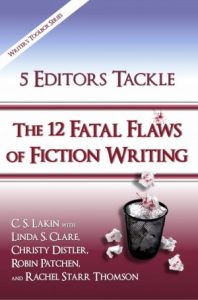7 Tips to Avoid Overwriting
Repetition. Redundancy. Useless words.
All fiction writers fall into the trap of overwriting. We’re lured by the desire to be clear and thorough in our descriptions. To make sure the reader gets what we’re trying to say. We think if we pack our sentences full of words, we’ll get the point across. We’ll convey the right emotion and, in turn, evoke the emotional response we long for in our readers.
But however logical that seems, the odd truth is that, more often than not, less is more. Plot and character motivation can come across more strongly and effectively with fewer words. Carefully chosen words. Just the right words put down just the right way.
We tend to underestimate our readers’ ability to fill in blanks. We tend to get too close to what we are writing to see it clearly. We tend to doubt our own writing ability—and so we overwrite.
Gushing Is Fine . . . in a First Draft
Some writers find it helpful to gush onto the page in a first draft and worry about the cleanup later. Go ahead and do that. It’s a good way to keep the creative juices flowing and get the story out in some form. But too often writers get attached to what they’ve written. The sentences harden into concrete seconds after they appear on the page or computer screen. It takes courage and stalwart determination to be a brutal self-editor and hack away at those sentences.
While some writers “underwrite” (a flaw we’ll cover later in this book), most writers fall victim to overwriting. Overwriting is probably the most common flaw of fiction writing, and its tentacles reach into every aspect of a writer’s story: narrative, dialogue, action, and internalizing. Like a contagion, it infects our scenes so they die a slow (or quick) death.
But good news! There is an antidote. The formula is one part determination, two parts knowledge, three parts diligence, and four parts mercilessness. Once you learn to detach emotionally from the words you write, the battle is half won.
Every word counts in your story. Every word has weight. It’s heartbreaking to launch your story into a sea of readers and watching it sink before it clears the harbor. So before you break that bottle of champagne over the bow, learn to identify the symptoms of overwriting. Then, with cutlass in hand, hack away. The examples in this chapter will show you how.
The Forest for the Trees
When you put pen to paper, it’s fully possible to underwrite. To fail to say what you meant to say. But just as possible, and more common, is overwriting—the tendency to say too much, in too many words, and crowd out the forest for the trees.
Overwriting takes many forms. Wordiness. Vagueness. Redundancy. Convolution. Pushing metaphors so far beyond the breaking point that they cease to be enlightening and become ridiculous instead.
In all forms, overwriting loses the forest for the trees. Readers get so snarled up in excessive words, tangled sentences, and overdone diction that the big picture is lost.
It’s not fun to read. And often, it’s not fun to write.
If your words feel forced or unnatural while you’re writing them, you might be falling into this trap. It often happens when we try to “sound like real writers,” or want to come across as particularly smart or poetic. In those cases we lose our own voices for something artificial.
Here are 7 tips to help you avoid overwriting:
- Include only the important details. Details are vital to believability. If you only paint your scene in general or vague words, readers are less likely to remain engaged. So how do you know what to include and what to leave out? Think of your story as a road that runs through a city. There are lots of other roads, but only this road leads readers to their destination: the story outcome. Along the way readers might smell the air or see the trees whizzing past, but they keep their eyes on the road. The extra details you provide should add to the experience of the story in a sensory-emotional way. They also need to be connected to what your main character is after, whether it’s a new love, a killer, or a pot of gold. All other details are of little importance to the story and usually can be safely eliminated.
- Leave Out the Boring Stuff. Elmore Leonard famously said, “I try to leave out the parts readers skip.” Many times these “boring” bits fall into the categories of stage directions. Stage directions that mimic real life can be insufferable for readers. For instance, let’s say you write a scene about a meeting your character must attend. In real life these meetings are often long and boring and filled with missteps. There’s a computer glitch, or someone is late. People drone on and on. You get the idea. The key to writing a scene showing a boring or otherwise mundane situation is to give the reader the feeling of boring or repetitive without actually making readers suffer through the actual boring thing.
- Practice Linda Clare’s “Rule of Three”: In general, give readers three details of something important that you need them to remember. These should be concrete and sensory—meaning they are connected in some way with the five senses and/or are very specific (e.g., a cherry-red Camaro instead of a red car). You can also use the Rule of Three to give the illusion of a boring or unimportant action or dialogue.
- Eliminate repetition and redundancy. Repetition is “the act of saying or doing something again.” When applied to language, it becomes redundancy, or “the act of using a word, phrase, etc., that repeats something else and is therefore unnecessary.” In fiction, this takes several forms.
- Repeating a certain word or phrase—just, very, he turned, she went
- Repeating a word structure—looked, stared, peered
- Repeating character traits—continually referring to a character’s hair or eye color
- Repeating character actions—he scratched his beard or she bit her lip
- Adding an unnecessary word to modify a verb—stood up, collaborated together, screamed loudly.
- Eliminate excessive punctuation. Don’t use more than one (!!), and don’t use it in conjunction with a question mark (!?). Publishers tend to discourage its use (some want no more than two or three exclamation points in an entire manuscript). Why? The exclamation point encourages weaker writing, since the author can use it alone to indicate emotion. Instead, stronger dialogue or narrative will better convey that emotion. Don’t use more than one question mark (??). Ellipses (. . .) are used to show trailing off of words (in dialogue) or of an idea (in narrative), or to show hesitation in dialogue. Ellipses fall into the same category as exclamation points and em dashes—use them judiciously.
- Avoid Purple Prose. Flowery language and big, rarely used words may seem impressive, but they only make sense in your scenes if your character is the kind of person that would think and speak that way. It’s all about staying in character. And when you, the author, uses purple prose to sound erudite, it will merely make you sound like a smarty-pants.
- Less is more. Perhaps my favorite bit of advice. I often share with my clients something my eleventh-grade English teacher used to spout frequently: “Say what you mean. Don’t say what you don’t mean.” The best way to say what you mean is to use only the words you need—the most appropriate words for your context—and discard the rest. Think of the pages of your novel as expensive real estate. Writers who want to write well should aim to be as picky about the words they string together as the foods they eat or the clothes they wear. Pickier. Your novel’s pacing will be greatly affected by word choice. If you bog down your sentences with unnecessary words, your scenes will drag. In addition, using boring, flat, or weak verbs and adjectives will make the reading dull, no matter how exciting your plot might be.
A great way to seek and destroy extraneous words and passages is to use Word’s Find and Replace. Search for it was, there were, ing, and ly. Often a word ending in ing will reveal a wordy phrase, and ly will catch adverbs (we’ll cover pesky adverbs in a later chapter).
Overall, take the time to consider each word you use and see if you can’t come up with a better word, maybe one more colorful or descriptive. A phrase like “It was interesting and I liked it” is not interesting, and readers won’t like it. Write in your unique style and genre, but do it well.
Think of rewriting as creating a reduction sauce. The more you can eliminate those words and phrases that are not rich in flavor, the less you will have in the end. Which is more. And more, in most cases, is better.
As you go through your scenes, challenge every word and phrase. Keep in mind the objectives of your scene and your big picture—your premise and the story you are telling. Remember that overwriting doesn’t pertain to just the little bits of punctuation and the words making up a sentence. It can also manifest on the macro level, by cluttering your story with unnecessary actions and dialogue that do nothing to advance or reveal key points of character and plot.
When checking your scenes for overwriting, try not to narrow your focus such that you only see the trees. Step back and scan the forest. Sometimes that means entire scenes should be cut. The key to conquering overwriting is to be brutal. Don’t get overly attached to your words. Be willing to sacrifice some on the altar of clarity and effectiveness. Repeat this mantra in your head when you find yourself hesitating to “kill your darlings”: Less is more . . . Less is more . . .
Want to weed out all the fatal flaws of fiction writing? Get the book and study the chapters and sample passages! It will quickly elevate your writing!
Featured Photo by Markus Spiske on Unsplash













Thanks for this. My critique partners tell me I’m overwriting quite often. I hope your tips will help stop this.
I’ve read books with whole scenes that do nothing to advance the plot, like one where a hockey game was described in detail, while nothing happened that was pertinent. Similarly, the book I’m currently reading has details of a baseball game. I can’t see where it adds to anything, neither plot nor character. I know the first writer is a hockey enthusiast, and probably enjoyed writing it, but I skipped most of it. Don’t know if the second writer is a baseball buff, but I expect he is.
Things like this are great to write if you really enjoy that game, or whatever, but not everyone is. Especially Viz baseball to someone not from the US who doesn’t understand the game. ie. Me.